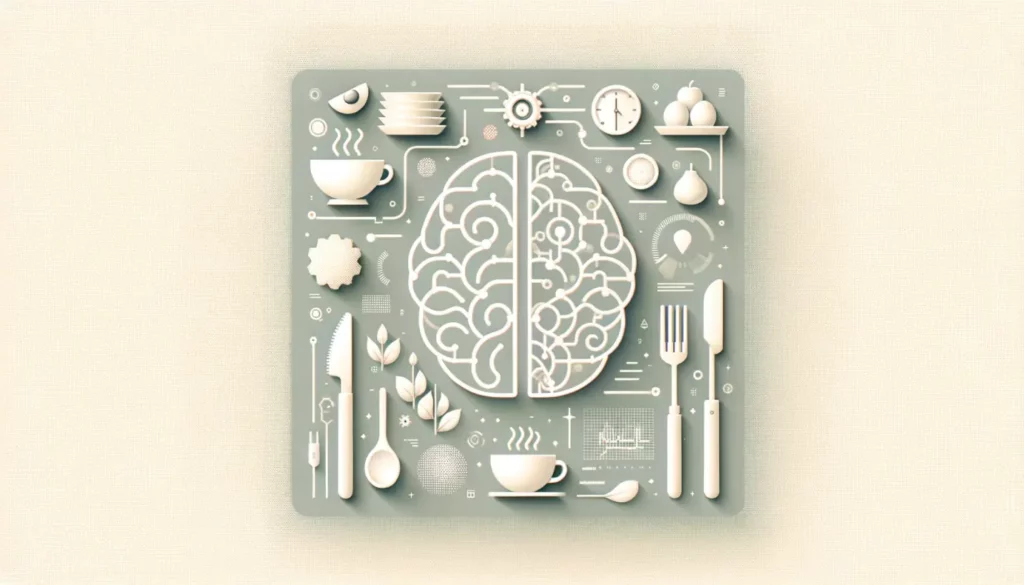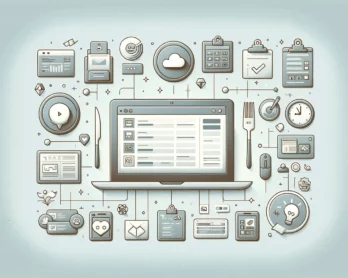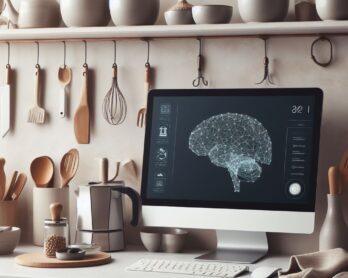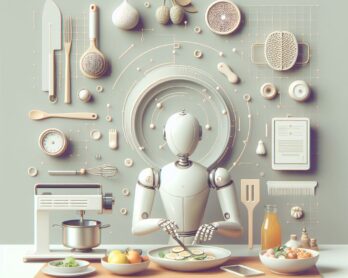- Key Takeaways
- Harnessing AI for Enhanced Food Production
- The Digital Chef: AI’s Role in Culinary Innovation
- Smarter Supply Chains: AI’s Impact on Distribution and Retail
- AI-Powered Quality Assurance in the Food Sector
- Sustainable Solutions: AI’s Contribution to Food Security and Environmental Impact
- The Future Plate: Innovations Shaping Tomorrow’s Food Industry
- Summary
- Frequently Asked Questions
Imagine a world where the food on your plate is produced with the help of artificial intelligence in food industry (AI), tailored to your individual preferences, and with minimal environmental impact. The future of food is here, and AI is revolutionizing the industry, from enhancing food production and culinary innovation to creating smarter supply chains and ensuring food safety. Let’s dive into the fascinating world of AI-powered food industry innovations and discover how artificial intelligence in food industry is reshaping the way we grow, cook, and consume food.
Key Takeaways
Harness AI for more efficient & sustainable food production, from precision agriculture to smart manufacturing.
The Digital Chef: AI is revolutionizing culinary innovation with recipe development and kitchen automation.
Smarter supply chains using inventory management, demand forecasting & delivery services powered by AI for improved efficiency and sustainability.
Harnessing AI for Enhanced Food Production
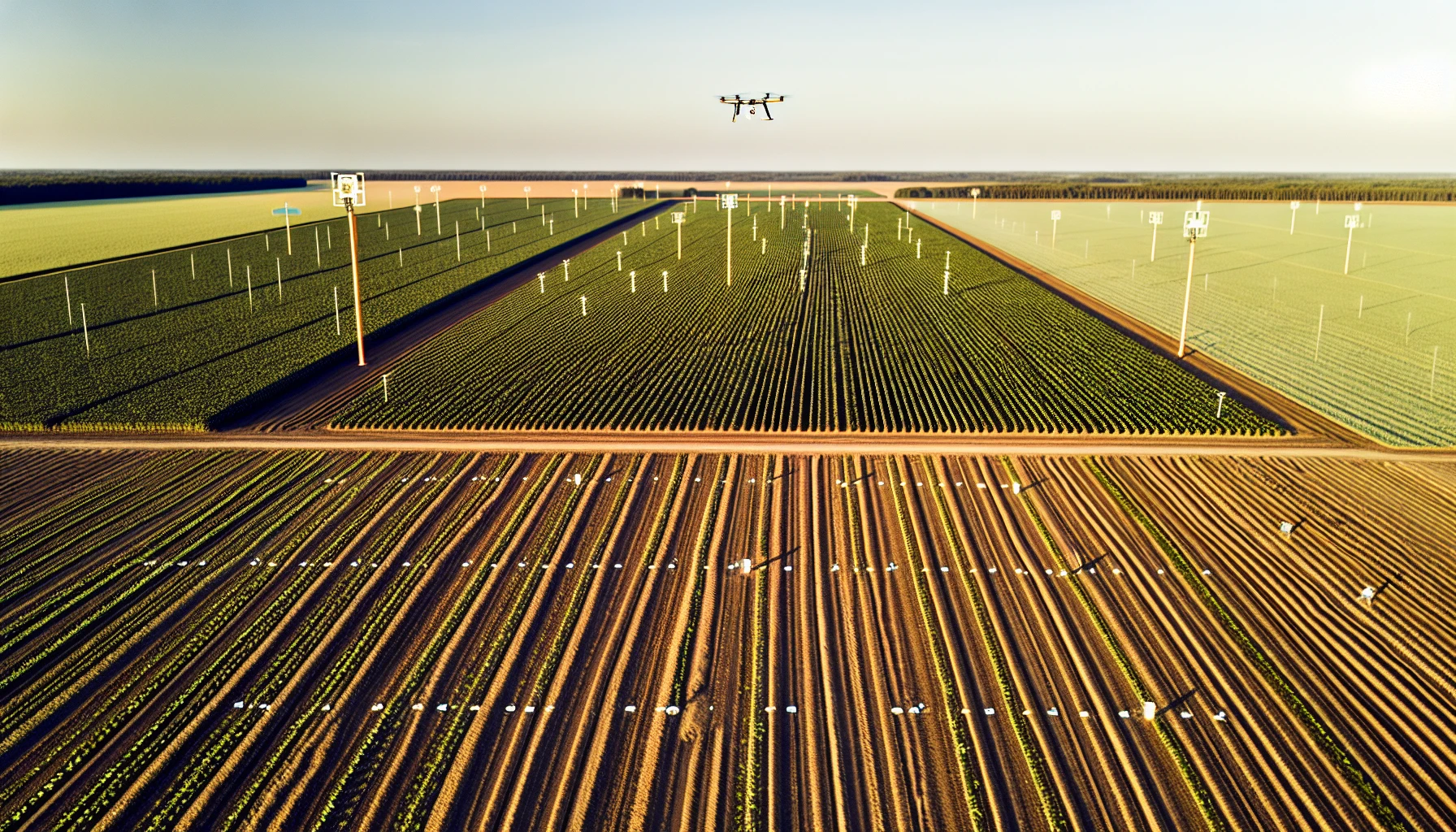
The food industry is under constant pressure to produce food with fewer resources, while catering to the growing demand for healthier and more sustainable options. Artificial intelligence is stepping up to this challenge, offering food manufacturers and industry leaders a way to optimize production.
Wondering how AI contributes to food production? Through enhancing precision agriculture, optimizing smart manufacturing, and implementing waste reduction strategies, AI paves the way for heightened efficiency and food sustainability.
Precision Agriculture
Precision agriculture is a game-changer. It combines AI-driven technologies like drones, sensors, and machine learning to optimize crop yields and reduce resource consumption. Drones take to the skies, providing valuable insights on soil conditions, crop health, and potential safety hazards. This bird’s-eye view helps farmers make informed decisions on irrigation, fertilization, and disease detection, ultimately improving the quality of processed food.
Machine learning has a significant part in enhancing crop yields as it analyzes factors that influence crop growth and productivity. By processing vast amounts of data, AI discerns trends and patterns, enabling farmers to refine their strategies, yielding better quality harvests and bolstering food security. With such powerful tools at their disposal, the future of farming looks brighter than ever.
Smart Manufacturing
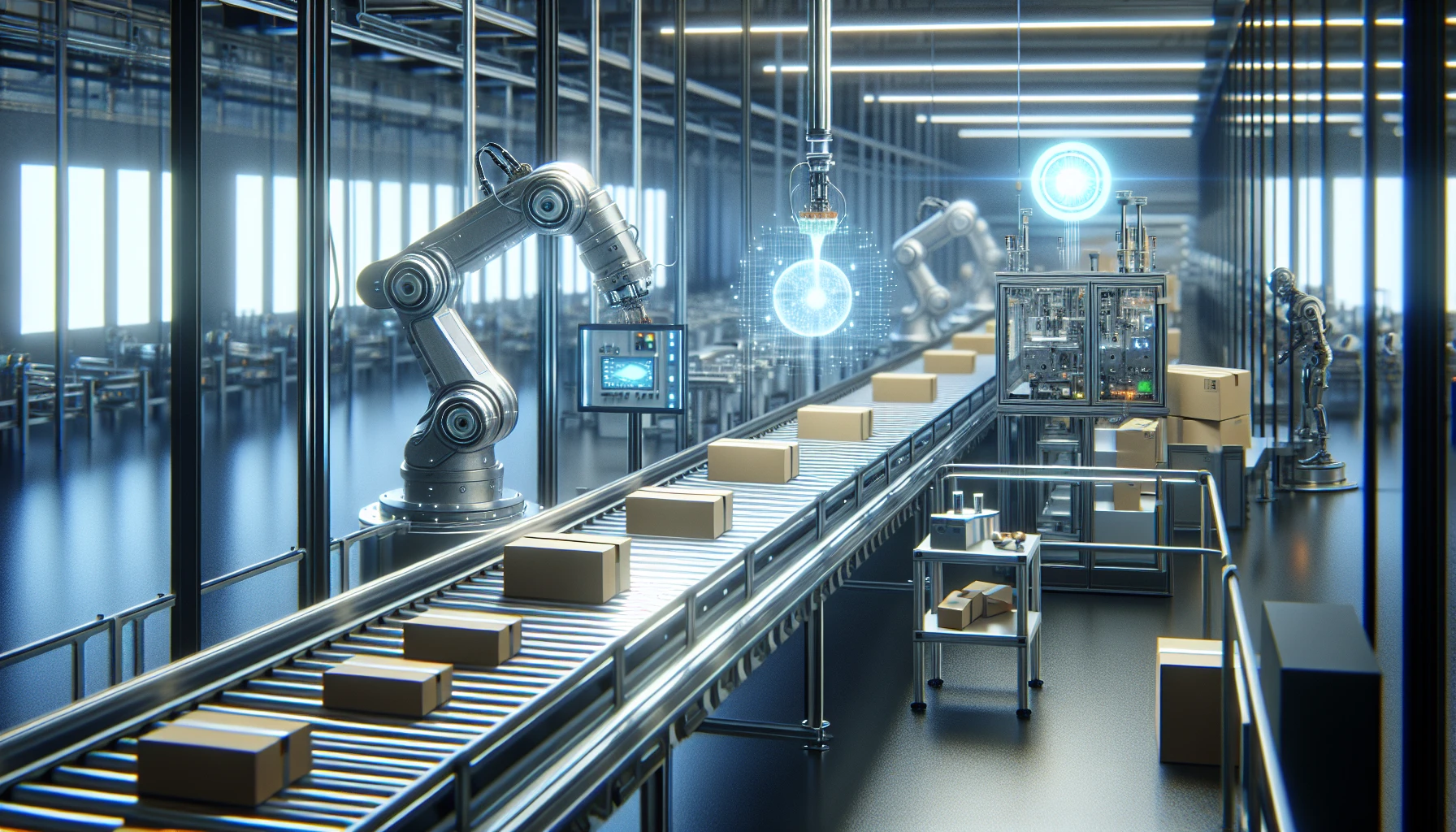
Smart manufacturing is another area where AI shines, automating food processing, packaging, and quality control. AI-powered systems like computer vision and smart sensors enable food sorting and inspection with impeccable accuracy, ensuring food items meet the highest quality standards.
The advantages of AI in food manufacturing include:
Quality control
Fine-tuning production parameters
Curbing labor costs
Boosting productivity
The result is a more efficient food industry, capable of meeting the growing demand for diverse and high-quality products while keeping an eye on food safety and sustainability.
Waste Reduction Strategies
Waste reduction is a paramount concern in the food industry. Strategies powered by AI aid in minimizing food loss and optimizing resource usage across the supply chain. By accurately managing inventory and predicting demand, AI helps food businesses save money and reduce their environmental impact.
Edible packaging and other eco-friendly packaging options are emerging as innovative solutions to tackle food waste and environmental concerns. These latest technology advancements demonstrate the power of AI in transforming the food industry and promoting food sustainability.
The Digital Chef: AI’s Role in Culinary Innovation
The culinary world is well-acquainted with the marvels of AI. Spanning from recipe development to kitchen automation, AI is radically transforming our cooking and eating experiences. Robots are now entering commercial kitchens, assisting with tasks like chopping, roasting, and even garnishing the final dish. These digital chefs not only enhance our dining experiences but also pave the way for a more efficient and sustainable food sector.
The influence of AI in culinary innovation extends beyond the kitchen. AI algorithms scrutinize consumer preferences and food trends, formulating new recipes and products that accommodate evolving tastes and dietary necessities. The result? A more dynamic and personalized food industry, with AI-powered solutions that delight our taste buds while promoting food sustainability.
Recipe Development
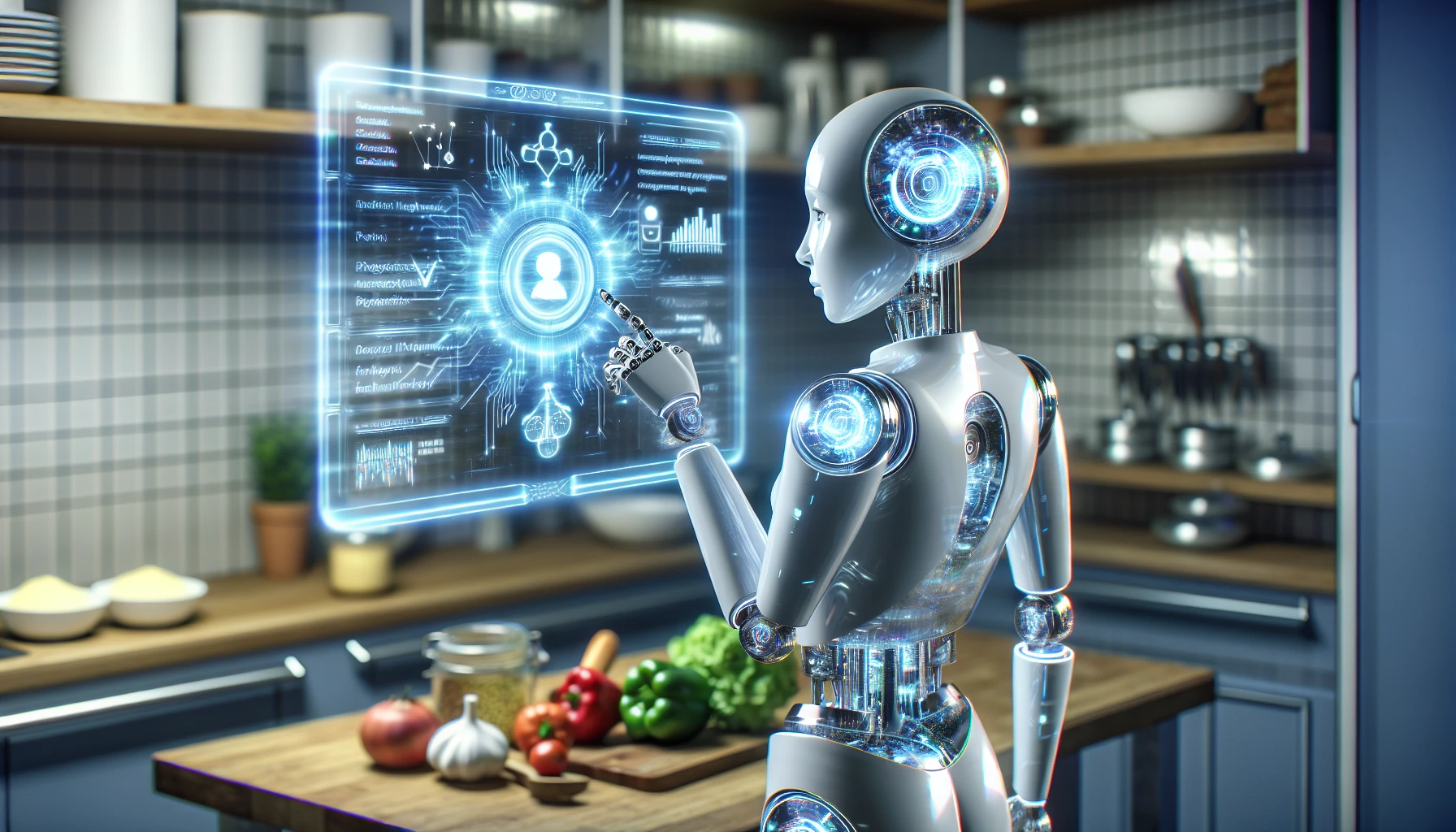
One might wonder how AI can create mouth-watering food recipes. It’s all about the data! AI algorithms analyze vast databases of recipes, ingredients, and even social media trends to come up with innovative and unique dishes that cater to individual preferences and dietary restrictions.
From cakie (cake-cookie hybrid) to spicy chicken noodle, AI-generated recipes are redefining the culinary landscape, offering endless possibilities for chefs and food enthusiasts alike. By constantly adapting to new trends and tastes, AI-driven recipe development is revolutionizing the way we experience food and nourish our bodies.
Kitchen Automation
Imagine a kitchen where robots handle the tedious tasks of food preparation, cooking, and cleaning. This futuristic vision is becoming a reality, thanks to AI and robotics. Kitchen automation not only streamlines food preparation but also improves accuracy, consistency, and food safety.
From AI-powered robots like Sally by Chowbotics to fully automated kitchen equipment, the possibilities are endless. As more restaurant owners and food manufacturers embrace these advanced technologies, the food industry will continue to innovate, adapt, and thrive in the face of ever-changing consumer demands and market trends.
Smarter Supply Chains: AI’s Impact on Distribution and Retail
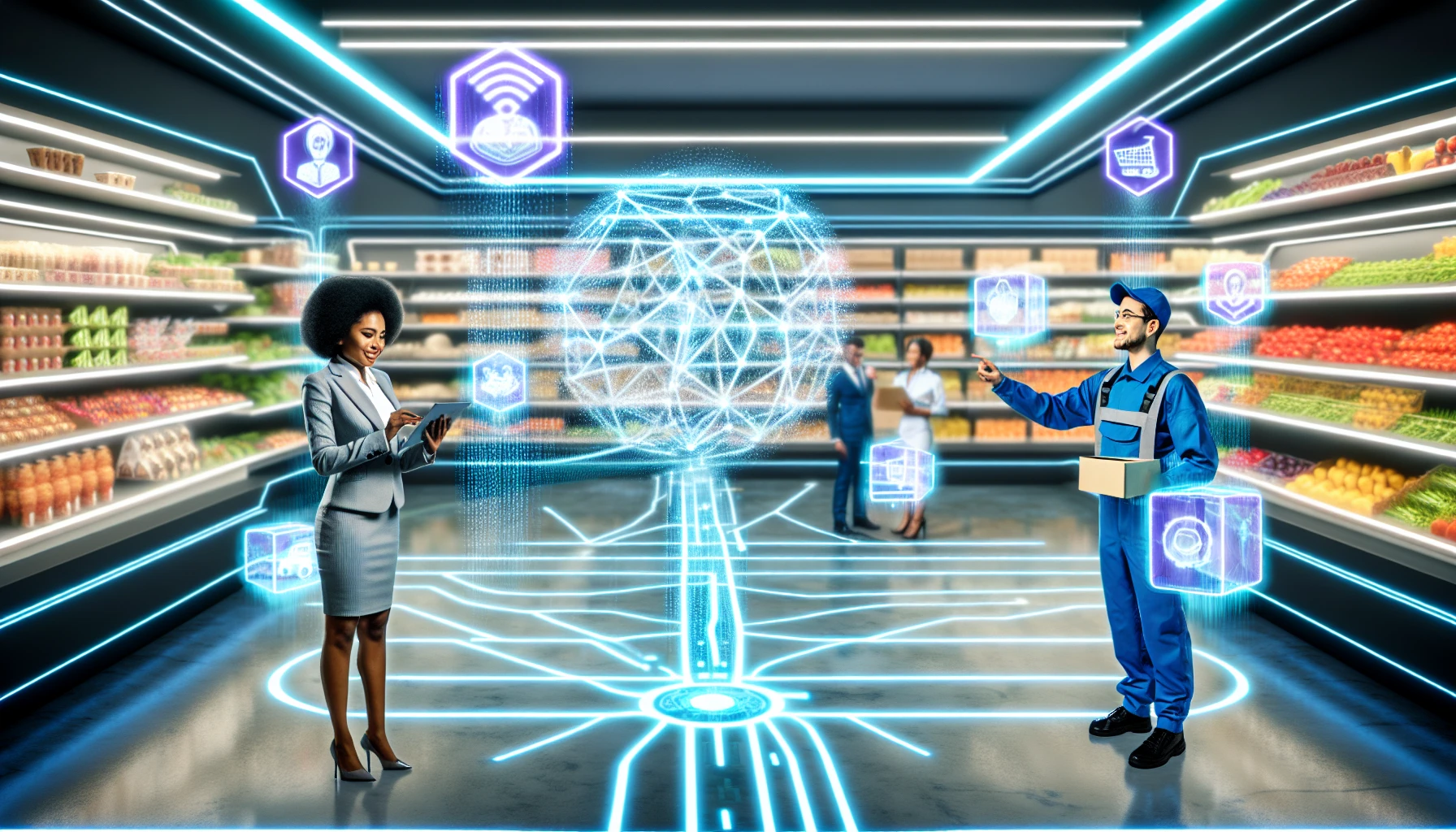
Distribution and retail constitute a key aspect of the food industry. In this area, AI is making considerable advancements by refining inventory management, augmenting demand forecasting, and improving delivery services. These advancements help food businesses streamline their operations, reduce waste, and ensure product availability, ultimately leading to a more efficient and sustainable food system.
The impact of AI on distribution and retail is not limited to food production alone. AI-driven innovations are also transforming the way we shop for groceries, dine out, and order food online. As artificial intelligence technologies continue to evolve, we can expect even more exciting developments in the food industry.
Inventory Management
Inventory management systems powered by AI are altering the way food businesses handle their stock levels. Through stock level optimization and waste reduction, AI guarantees product availability and economizes for businesses.
Thanks to AI’s powerful algorithms and machine learning capabilities, businesses can now easily monitor and adjust stock levels in real-time, preventing overstocks and shortages, and using resources more efficiently. This data-driven approach to inventory management is paving the way for a more sustainable and efficient food industry.
Demand Forecasting
Predicting consumer demand is no easy task, but AI is helping food businesses stay a head of the curve by accurately forecasting market trends and adjusting production and distribution accordingly. By analyzing historical data, market trends, and customer behavior, AI-powered demand forecasting systems offer food businesses valuable insights into current and future consumer demand.
These AI-driven forecasts not only help businesses optimize their production processes but also enable them to make data-driven decisions, ensuring that their products are always available to meet the ever-changing needs of the market. As AI continues to shape the food industry, businesses can expect even more accurate and adaptable demand forecasting solutions.
Enhancing Delivery Services
Delivery services play a crucial role in the food industry. AI is enhancing these services by optimizing routes, predicting delivery times, and personalizing customer experiences. By leveraging real-time traffic data, weather conditions, and historical delivery patterns, machine learning algorithms can determine the most efficient routes, reducing errors and improving overall delivery efficiency.
AI-powered solutions also help food delivery services predict delivery times with remarkable accuracy, improving customer satisfaction and streamlining operations. As AI continues to revolutionize the food industry, we can expect even more innovative and customer-centric delivery services in the future.
AI-Powered Quality Assurance in the Food Sector
Quality assurance is a fundamental facet of the food industry, safeguarding food safety and upholding high food quality standards all through the production process. AI-powered quality assurance systems are transforming the way food companies monitor and maintain these standards.
From tracking ingredients and detecting contaminants to ensuring compliance with food safety regulations, AI technologies are revolutionizing food safety monitoring and quality control processes. Let’s explore how AI is making a difference in ensuring the safety and quality of the food we consume.
Food Safety Monitoring
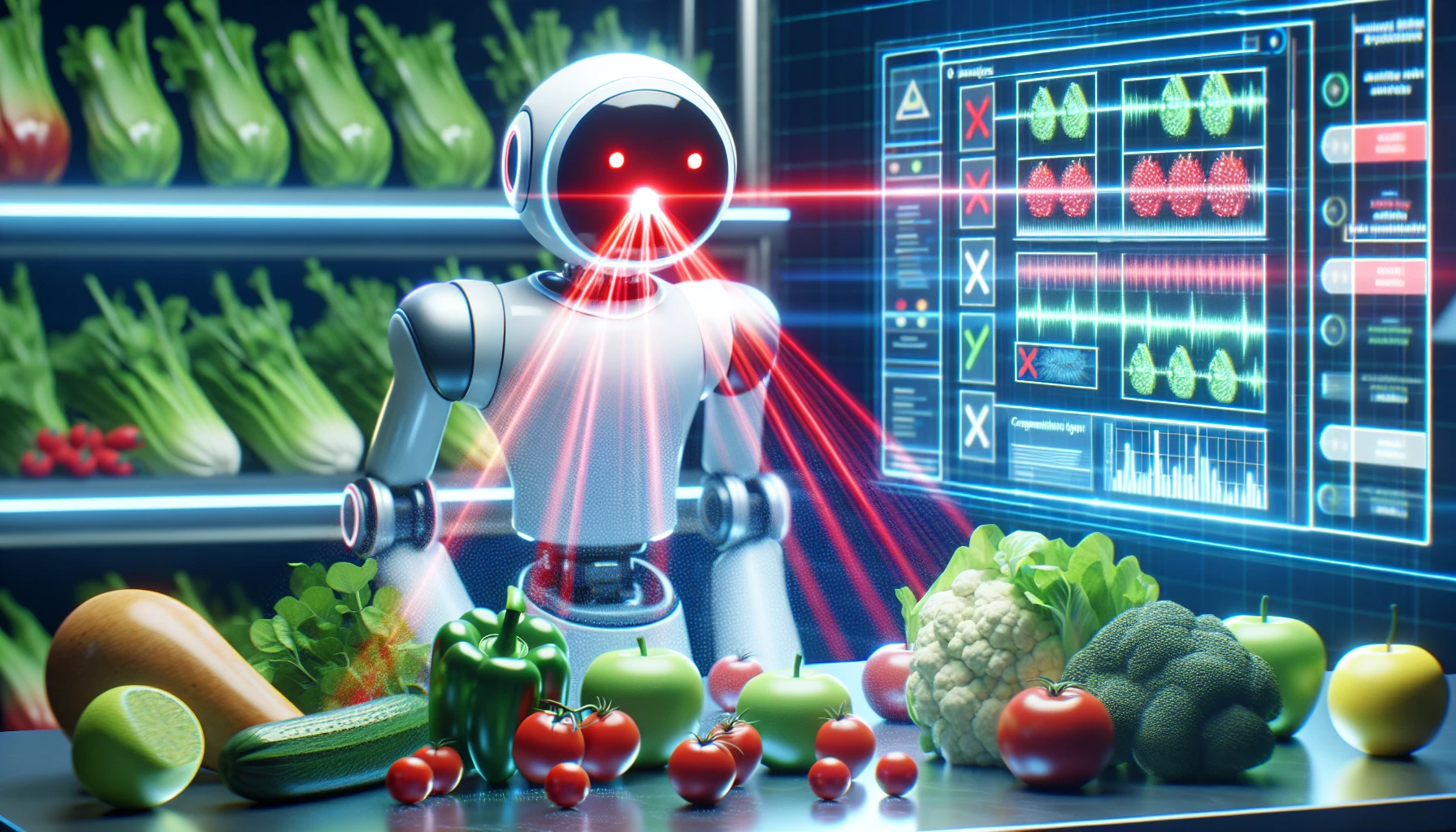
AI technologies play a crucial role in food safety monitoring by tracking ingredients, detecting contaminants, and ensuring compliance with regulations. By providing real-time data and insights on ingredients, potential contaminants, and safety issues, AI helps food businesses quickly identify and address food safety concerns, ensuring that the food we consume is safe and of the highest quality.
In addition to tracking ingredients, AI also helps detect contaminants in food production. By analyzing standardized data and using machine learning algorithms, AI-powered systems can detect contaminants and pathogens, ensuring the safety and quality of food products throughout the supply chain.
Quality Control Processes
Quality control processes are essential in maintaining high standards in food production. AI and machine learning technologies are revolutionizing these processes by analyzing product quality, detecting defects, and optimizing production parameters.
AI-driven quality control systems use computer vision and machine learning algorithms to analyze images and videos of food products, identifying patterns and detecting defects or abnormalities. This automated approach offers several benefits:
Streamlines defect detection during production
Ensures that food products meet the highest quality standards
Contributes to a safer and more sustainable food industry.
Sustainable Solutions: AI’s Contribution to Food Security and Environmental Impact
Food security and environmental impact are urgent issues needing to be tackled for a sustainable future. AI has a pivotal role in endorsing sustainable solutions and aiding agricultural organizations through resource usage optimization, waste minimization, and delivering data-driven insights for better decision-making.
As we continue to explore the potential of AI in the food industry, we can look forward to more innovative and sustainable solutions that help address food security and reduce the environmental impact of food production.
Reducing Environmental Footprint
AI-driven technologies are helping to reduce the environmental footprint of food production by:
Optimizing resource usage
Minimizing waste
Making informed decisions about water usage, fertilizer application, and other resource-intensive processes
Ultimately promoting food sustainability
By providing valuable insights on soil health, crop monitoring, and potential safety hazards, AI-driven technologies enable farmers to adopt sustainable farming practices that not only contribute to food security but also reduce the environmental impact of food production.
Supporting the Agriculture Organization
AI is playing a crucial role in supporting agriculture organizations by providing data-driven insights, improving decision-making, and promoting sustainable farming practices. With AI technology at their disposal, farmers can now make informed decisions about resource allocation, crop management, and other critical aspects of farming, ultimately contributing to food security and environmental sustainability.
By analyzing vast amounts of data and using machine learning algorithms, AI-driven systems can help the Food and Agriculture Organization optimize their operations, reduce waste, and ensure the continued production of high-quality food. As AI continues to shape the future of the food industry, we can expect even more innovative and sustainable solutions in the years to come.
The Future Plate: Innovations Shaping Tomorrow’s Food Industry
The future of the food industry resides in the union of innovation and sustainability. Some thrilling developments shaping the food industry of tomorrow encompass edible packaging, 3D printing, and personalized nutrition, all fueled by AI and cutting-edge technologies.
As we move forward, we can expect to see even more groundbreaking innovations that not only cater to our individual tastes and dietary needs but also contribute to a more sustainable and environmentally-friendly food system.
Edible Packaging and 3D Printing
Edible packaging and 3D printing offer sustainable and customizable food solutions, reducing waste and catering to individual preferences. Edible packaging, made from natural, plant-based materials, not only provides better storage and safety for food products but is also more eco-friendly than traditional plastic packaging.
3D printing, on the other hand, opens up a world of possibilities for food production. With the ability to create food in a wide range of shapes and designs, 3D printing can revolutionize food production, offering endless opportunities for culinary creativity and sustainable food solutions.
Personalized Nutrition
Personalized nutrition is the future of healthy eating. Driven by AI algorithms and data analysis, personalized nutrition tailors dietary recommendations to individual needs, promoting health and well-being.
By analyzing personal information such as genetics, lifestyle, and dietary choices, AI can provide customized nutrition plans that cater to individual preferences and health goals. This approach not only optimizes health outcomes but also empowers individuals to take control of their own well-being through tailored guidance and support.
Summary
From enhancing food production and culinary innovation to ensuring food safety and promoting sustainable solutions, AI is truly revolutionizing the food industry. As we continue to harness the power of AI and advanced technologies, we can look forward to a future where food is produced more efficiently, tailored to our individual preferences, and with minimal environmental impact. The future of food is here, and it’s powered by artificial intelligence.
Frequently Asked Questions
How is artificial intelligence used in food industry?
AI is used in the food industry to automate processes, increase efficiency and quality control, as well as sort food with accuracy and precision. It enables a more efficient production process, higher yield, and less waste, using advanced X-ray scanners, cameras, and lasers.
What food companies use AI?
Wingstop, Campbell Soup, Domino’s and Panera are some of the food companies using AI for its various benefits, such as answering phones in Wingstop’s case.
What are the disadvantages of AI in food industry?
The use of AI in restaurants comes with a hefty price tag, as well as the possibility of compromising guest data and privacy. Furthermore, it can lead to job losses and require extensive training, creating additional costs.
How does AI contribute to food sustainability?
AI is helping make food production more efficient, using resources more judiciously and reducing waste along the way, leading to more sustainable food practices.
How can AI help businesses with inventory management and demand forecasting?
AI can help businesses better manage their inventory and forecast demand, allowing them to optimize stock levels, predict future demand, and adjust production and distribution to match. This ensures product availability and reduces waste.

